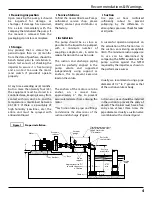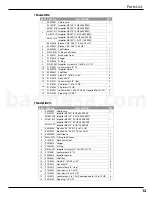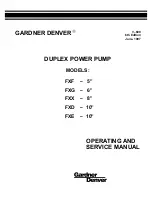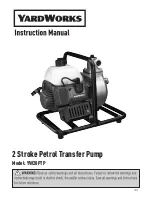
4
Recommendations & Warnings
4
Receiving inspection
Upon receiving the pump, it should
be inspected for damage or
shortages. If damage has occurred,
file a claim immediately with the
company that delivered the pump. If
the manual is removed from the
packaging, do not lose or misplace.
4
Storage
Any product that is stored for a
period longer than six (6) months
from the date of purchase should be
bench tested prior to installation. A
bench test consists of, checking the
impeller to assure it is free turning
and a run test to assure the motor
(and switch if provided) operate
properly.
4
Service Stations
To find the nearest Barmesa Pumps
authorized service shop, please
directly contact your distributor or
the factory.
The anchors of the motor are to be
anchor,
on
a
raised
base,
approximately 4", this to prevent
accumulated water from entering the
motor.
**See friction table in pipes and fittings
to determine the dimensions of the
suction and discharge. (Page 8)
At any time exceeding six (6) months,
but no more than twenty four (24),
the equipment must be stored in a
controlled area, keeping it away from
contact with rain, dust, etc., and the
temperature is maintained between
43-104 °F. If there is a possibility of
high humidity (coastlines, etc.), the
entire unit must be sprayed with
antioxidant liquid.
4
Installation
The pump should be as close as
possible to the liquid to be pumped,
with a minimum number of
couplings, adapters, etc., in order to
reduce friction on the suction side.
The suction and discharge piping
must be perfectly aligned in the
pump
volute
and
supported
independently using support or
anchors, this to prevent excessive
load on the volute.
A successful operation depends on
the calculation of the friction loss in
the suction, considering acceptable
limits. The minimum suction pipe size
to use can be determined by
comparing the NPSH available at the
pump suction against the NPSH
required by the impeller, as shown in
the performance curves.
Usually, we recommend using a pipe
diameter of 1/2" to 1" greater as that
of the suction volute or body.
A strainer or sieve should be installed
in the suction to prevent the entry of
objects. The strainer must have a free
entry area at least three times the
pipe diameter. Usually a suction valve
is combined with a strainer
Figure 1
.
Use pipe or hose reinforced
sufficiently
robust
to
prevent
collapsing by the difference in
atmospheric pressure. Check for leaks
at all joints.
4
Suction
Figure 1
Proper installation.
Motor
Anchors
Base
Pippe
support
Eccentric
reducer
Vacuum
gauge
Straight pipping as short
as possible, but not less
than 6 times the
"D" diameter
Perfectly
sealed joints
As close
as possible
As close
as possible
Strainer
Appropriate size "D"
to avoid the excess
of friction
1 "D"
min.
4 "D"
min.
Suction
valve
Suction
valve
4"
"D"
barmesa.com
Summary of Contents for IB Series
Page 15: ...14 barmesa com...

































